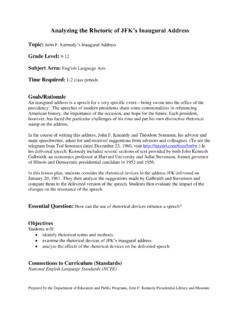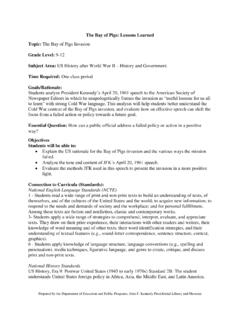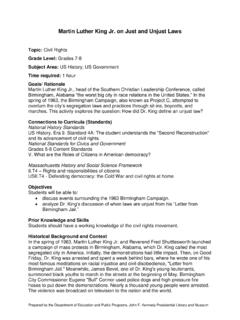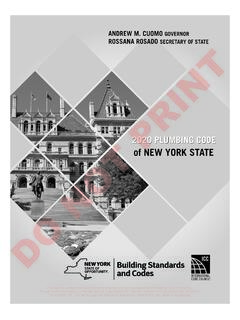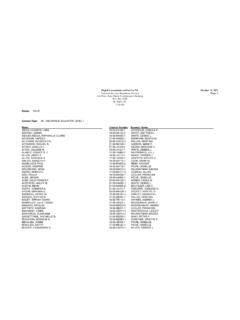Transcription of Interpreting JFK’s Inaugural Address
1 Prepared by the Department of Education and Public Programs, john F. kennedy presidential library and Museum Interpreting JFK s Inaugural Address Topic: President kennedy s Inaugural Speech Grade Level: 9- 12 Subject Area: US History Time required: 1 class period Goals/ Rationale President kennedy s Inaugural speech addressed not only the American people, but also people throughout the world including newly independent nations, old allies, and the Soviet Union. In this lesson plan, students are challenged to consider how the speech might have resonated with some of these audiences. Essential Question: How can a speech or public statement resonate differently with various audiences, depending upon their point of view? Objectives Students will: discuss the significance of events leading up to kennedy s inauguration. analyze the Inaugural Address from three perspectives a young civil rights activist, a Soviet diplomat, and a Cuban exile.
2 Evaluate the speech from one of these perspectives. Connections to Curriculum (Standards) National History Standards History: Postwar United States (1945 to early 1970s), Era 9: 2A: The student understands the international origins and domestic consequences of the Cold War. 3B: The student understands the New Frontier and the Great Society. MA Framework : Analyze how the failure of communist economic policies as well as resistance to Soviet military and diplomatic initiatives contributed to ending the Cold War. (Seminal Primary Document to Read: JFK s Inaugural Address ) USII. 28: Analyze the important domestic policies and events that took place during the presidencies of Presidents kennedy , Johnson, and Nixon. Prior Knowledge and Skills Students should have a working knowledge of the Cold War, Civil Rights Movement, and the major events following World War II. Students should also know how to analyze a piece of text, and draw their own conclusions.
3 Prepared by the Department of Education and Public Programs, john F. kennedy presidential library and Museum Historical Background and Context On January 20, 1961, a clerk of the Supreme Court held the large fitzgerald family Bible as john F. kennedy took the oath of office to become the nation s 35th president. Against a backdrop of deep snow and sunshine, more than twenty thousand people huddled in 20-degree temperatures on the east front of the Capitol to witness the event. kennedy , having removed his topcoat and projecting both youth and vigor, delivered what has become a landmark Inaugural Address . His audience reached far beyond those gathered before him to people around the world. In preparing for this moment, he sought both to inspire the nation and to send a message abroad signaling the challenges of the Cold War and his hope for peace in the nuclear age. He also wanted to be brief.
4 As he d remarked to his close advisor, Ted Sorensen, I don t want people to think I m a windbag. He assigned Sorensen the task of studying other Inaugural speeches and Lincoln s Gettysburg Address to glean the secrets of successful addresses. The finely crafted final speech had been revised and reworked numerous times by kennedy and Sorensen until the president-elect was satisfied. Though not the shortest of Inaugural addresses, kennedy s was shorter than most at 1,355 words in length and, like Lincoln s famous speech, was comprised of short phrases and words. In addition to message, word choice and length, he recognized that captivating his audience required a powerful delivery. On the day before and on the morning of Inauguration Day, he kept a copy handy to take advantage of any spare moment to review it, even at the breakfast table. Having won the election by one of the smallest popular vote margins in history, kennedy had known the great importance of this speech.
5 Following his Inaugural Address , nearly seventy-five percent of Americans expressed approval of President kennedy . Materials Timeline of Cold War and civil rights events that occurred from January 1959 to January 20, 1961 JFK s Inaugural Address Three profiles of fictional individuals Procedure 1. Provide students with the handout Timeline: kennedy s Inaugural Address which provides a chronology of of Cold War and civil rights events that occurred from January 1959 to January 20, 1961. Discuss the historical significance of these events. 2. Divide students into groups of 3-4. 3. Provide each group with one of three profiles of a fictional individual responding to the speech: (a) a young civil rights activist, (b) a Soviet diplomat, or (c) a Cuban exile. 4. Have students to analyze the Inaugural Address and answer the questions associated with their individual. Prepared by the Department of Education and Public Programs, john F.
6 kennedy presidential library and Museum 5. Have students share their group s response with the entire class. Assessment For homework, have students role play the fictional individual and write a letter to President kennedy voicing their reaction to the Inaugural Address . Additional Resources Clarke, Thurston. Ask Not: The Inauguration of john F. kennedy and the Speech that Changed America. Henry Holt and Company, 2004. Hershberg, Jim. Introduction. A Typical Pragmatist : The Soviet Embassy Profiles john F. kennedy , 1960. Cold War International History Project Bulletin 4 (Fall 1994), 64-67. (Soviet document provided by Vladislav M. Zubok, National Security Archive, translated by Benjamin Aldrich-Moody.) Or online: ; scroll through to page 64. Hill, Kenneth L. Cold War Chronology: Soviet-American Relations, 1945-1991. Congressional Quarterly, Inc., 1993. Sorensen, Theodore C. kennedy .
7 Harper & Row, Publishers, 1965. Tofel, Richard J. Sounding the Trumpet: The Making of john F. kennedy s Inaugural Address . Ian R. Dee, Publisher, 2005. Prepared by the Department of Education and Public Programs, john F. kennedy presidential library and Museum Timeline kennedy s Inaugural Address January 1, 1959 Fidel Castro takes power in Cuba. January November, 1960 17 African nations achieve independence. February 1, 1960 African American students stage sit-in at a segregated lunch counter in Greensboro, NC. February 20, 1960 Whatever the exact facts may be about the size of the missile gap, it is clear that we shall need more missiles, more ships, planes and men, more atomic submarines and airlift mobility. --Remarks of Senator john F. kennedy at Jefferson-Jackson Day Dinner, Hartford, CT. April 17, 1960 Student Non-Violent Coordinating Committee (SNCC) is formed. May 1960 American U-2 Plane on an intelligence-gathering mission, piloted by Francis Gary Powers, is shot down over Soviet Territory the pilot is captured.
8 Paris Summit between Great Britain, France, the and is aborted. and Cuba establish diplomatic relations. July 9, 1960 Khrushchev says in a speech that the will come to Cuba s assistance if the attacks. July 12, 1960 At a news conference, Khrushchev accuses the of using the Monroe Doctrine to assert the right to steal from the Latin American people, and says the doctrine no longer applies in that region. July 14, 1960 State Department reaffirms that the principles of the Monroe Doctrine are still valid for Latin America. October 19, 1960 Martin Luther King, Jr. is arrested in Atlanta during mass sit-in demonstrations. JFK s subsequent call to Mrs. King helps gain him African American support in the election. November 8, 1960 john F. kennedy elected president. December 20, 1960 National Liberation Front (also known as Vietcong) is formed in South Vietnam. January 3, 1961 breaks off diplomatic and consular relations with Cuba.
9 January 6, 1961 In a secret speech to Communist leaders in Moscow, Khrushchev says the supports wars of national liberation. January 19, 1961 JFK and selected advisers meet with Eisenhower. On kennedy s agenda is a discussion of Trouble Spots Berlin, the Far East, and Cuba. kennedy is told of the critical importance of Laos and the deteriorating situation in that country. January 20, 1961 JFK s Inaugural Address . Prepared by the Department of Education and Public Programs, john F. kennedy presidential library and Museum Analyzing JFK s Inaugural Address Civil Rights Activist Profile You are a college-aged, African-American member of the Student Non-Violent Coordinating Committee (SNCC), a group of young civil rights activists formed in April 1960. Although the Supreme Court had ruled in 1954 in their Brown v. Board of Education decision that public schools must be integrated, you attended an all-black elementary and high school in Alabama and are now attending Fisk University, a private, all-black college in Nashville, Tennessee.
10 A few months ago, you participated in a sit-in in an effort to desegregate the lunch counter at the local department store. Your organization is planning more non-violent demonstrations. Initially, you did not support john F. kennedy for president because you thought that Richard M. Nixon, raised as a Quaker, might be a stronger advocate for civil rights. But, after hearing kennedy speak during his campaign about ending discrimination in federally subsidized housing by a stroke of the presidential pen, and after learning that he had called Coretta Scott King when her husband, Martin Luther King Jr., was unjustly thrown into jail in October 1960, you have been hopeful that kennedy might help gain equality for African Americans. You are sitting in the college dining hall with your friends, watching President kennedy s Inaugural Address on the university s black and white television set. What are your reactions to his speech?
